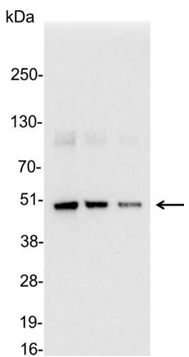Anti-ECS [Polyclonal]
Data
- -
- -
Antibody DetailsProduct DetailsHost Species Rabbit Immunogen DDDDK conjugated to KLH. Product Concentration 1.0 mg/ml Formulation Phosphate Buffered Saline (PBS), 0.09% sodium azide. State of Matter Liquid Product Preparation Purified by peptide affinity chromatography Storage and Handling This antibody is stable for at least one (1) year at 2-8°C. Country of Origin USA Shipping Next Day 2-8°C Applications and Recommended Usage? Quality Tested by Leinco Immunoblotting: use at a dilution of 1:1,000- 1:20,000
Immunocytochemistry: use at a dilution of 1:100-1:400. Immunoprecipitation: use 1-4ug/mg lysate ELISA: for detection use at a dilution of 1:1,000-1:30,000; for coating use at a dilution of 1:100-1:500. These are recommended dilutions. Note: For all Western blot analyses, blocking and antibody dilutions are performed using 5% Milk-TBST. Primary antibody incubations are carried out overnight. End users should determine optimal dilutions for their applications. Each investigator should determine their own optimal working dilution for specific applications. See directions on lot specific datasheets, as information may periodically change. DescriptionSpecificity Rabbit Polyclonal Antibody specific to ECS. Background The Enterokinase Cleavage Site (ECS) tag, represented by the unique amino acid sequence DYKDDDDK, serves as a highly versatile epitope tag in recombinant protein applications. Beyond its utility as a detectable epitope, the ECS tag possesses a distinct hydrophobic nature. This characteristic is crucial for maintaining the structural integrity and proper folding of the recombinant protein to which it is appended, potentially minimizing aggregation or misfolding. Furthermore, a key advantage of the ECS tag is its inherent function as a specific kinase cleavage site. This enzymatic recognition site allows for the precise and efficient removal of the tag from the recombinant protein, offering flexibility for downstream applications where a tag-free protein is desired. Antigen DetailsFunction Responsible for initiating activation of pancreatic proteolytic proenzymes (trypsin, chymotrypsin and carboxypeptidase A). It catalyzes the conversion of trypsinogen to trypsin which in turn activates other proenzymes including chymotrypsinogen, procarboxypeptidases, and proelastases. UniProt.org Research Area Epitope Tags References & CitationsTechnical Protocols |



